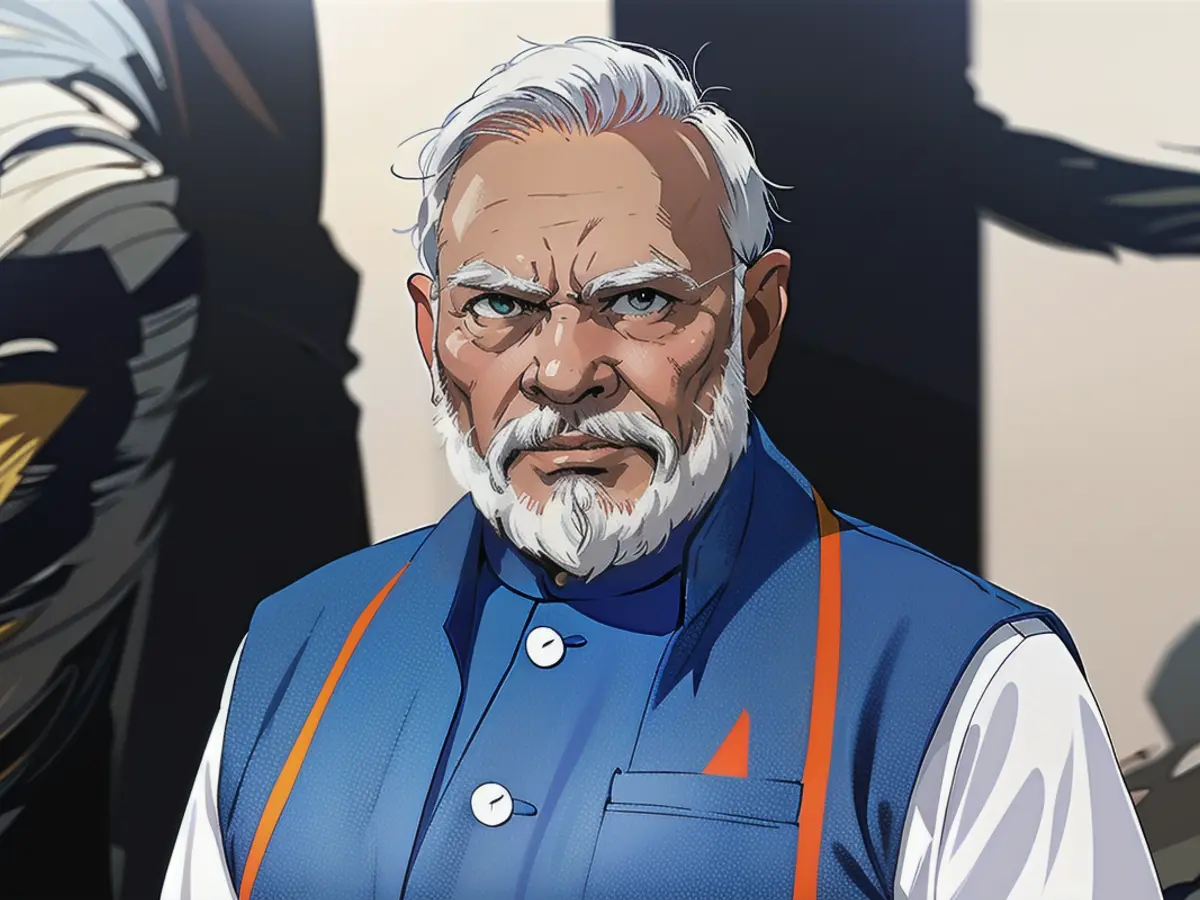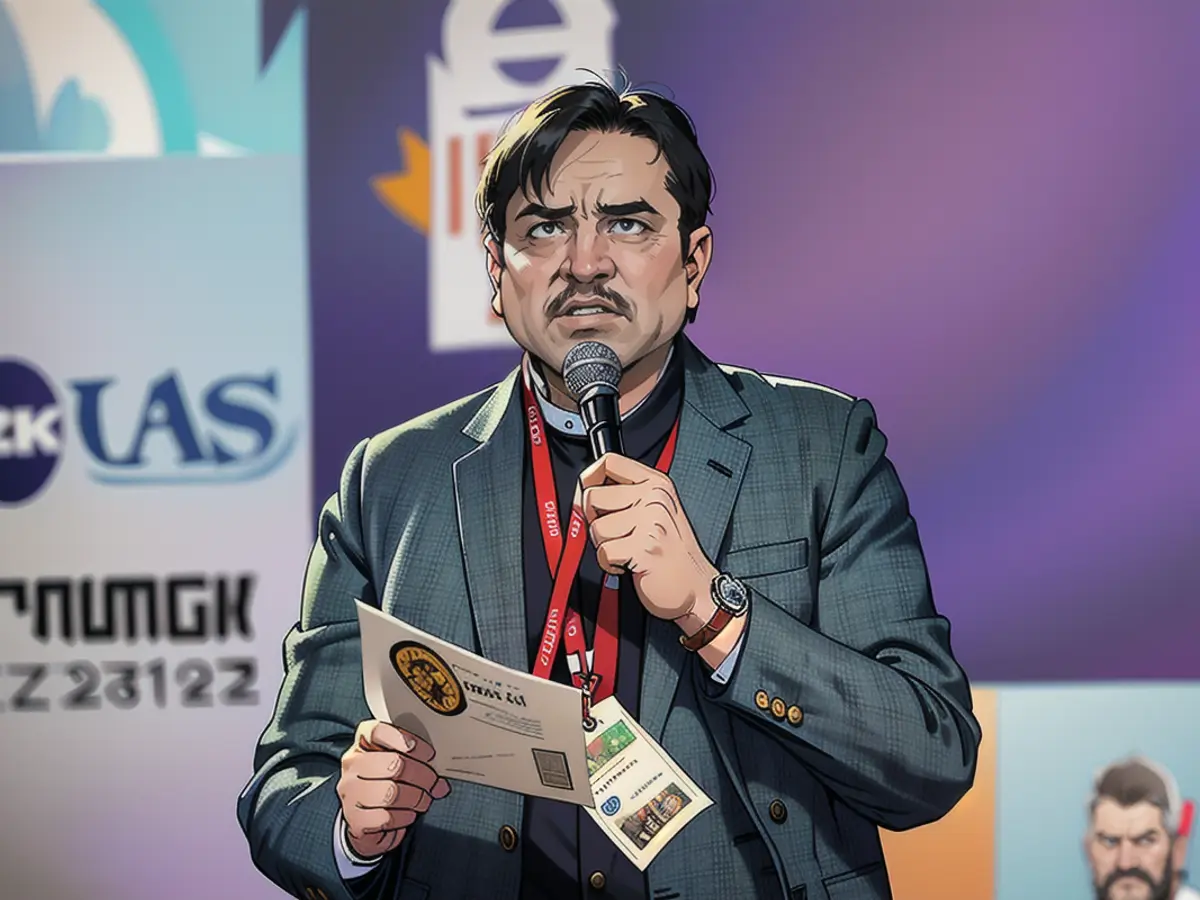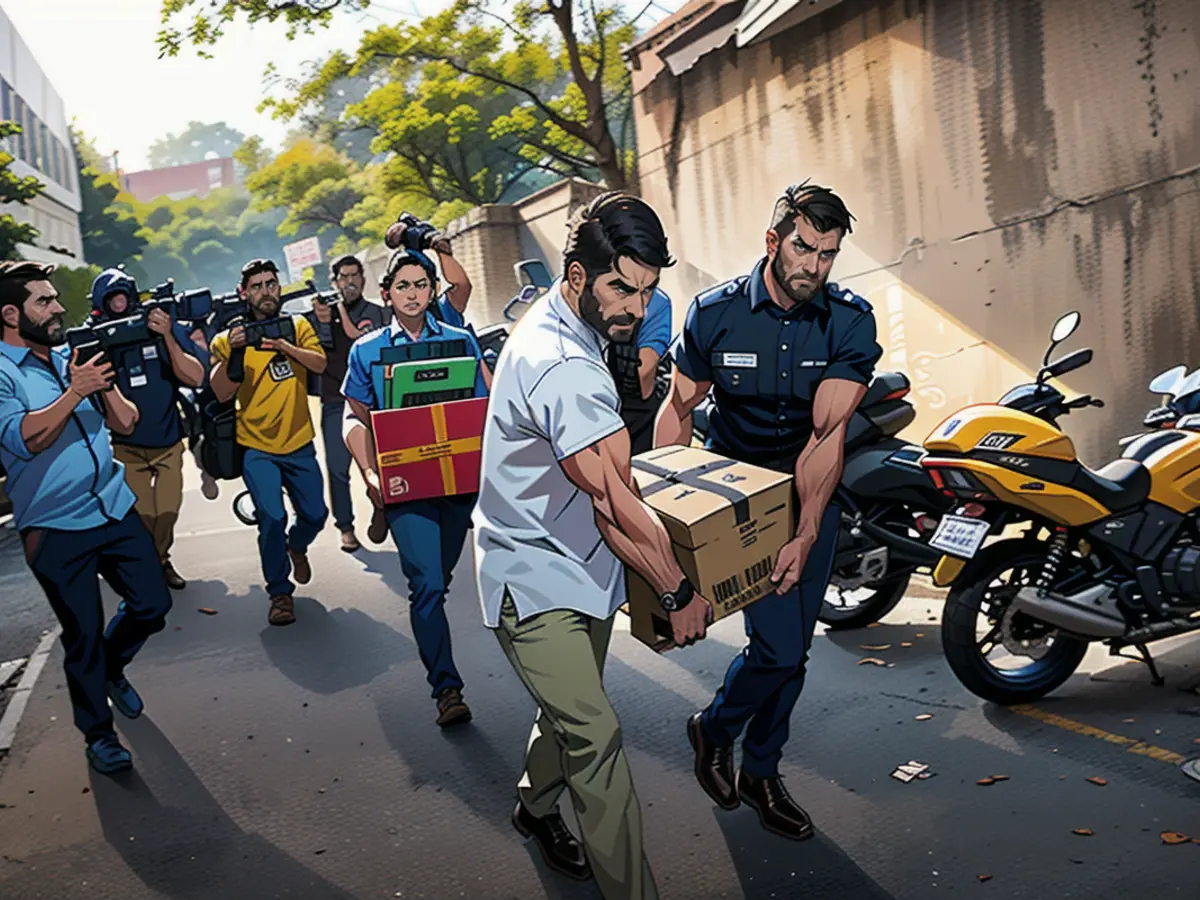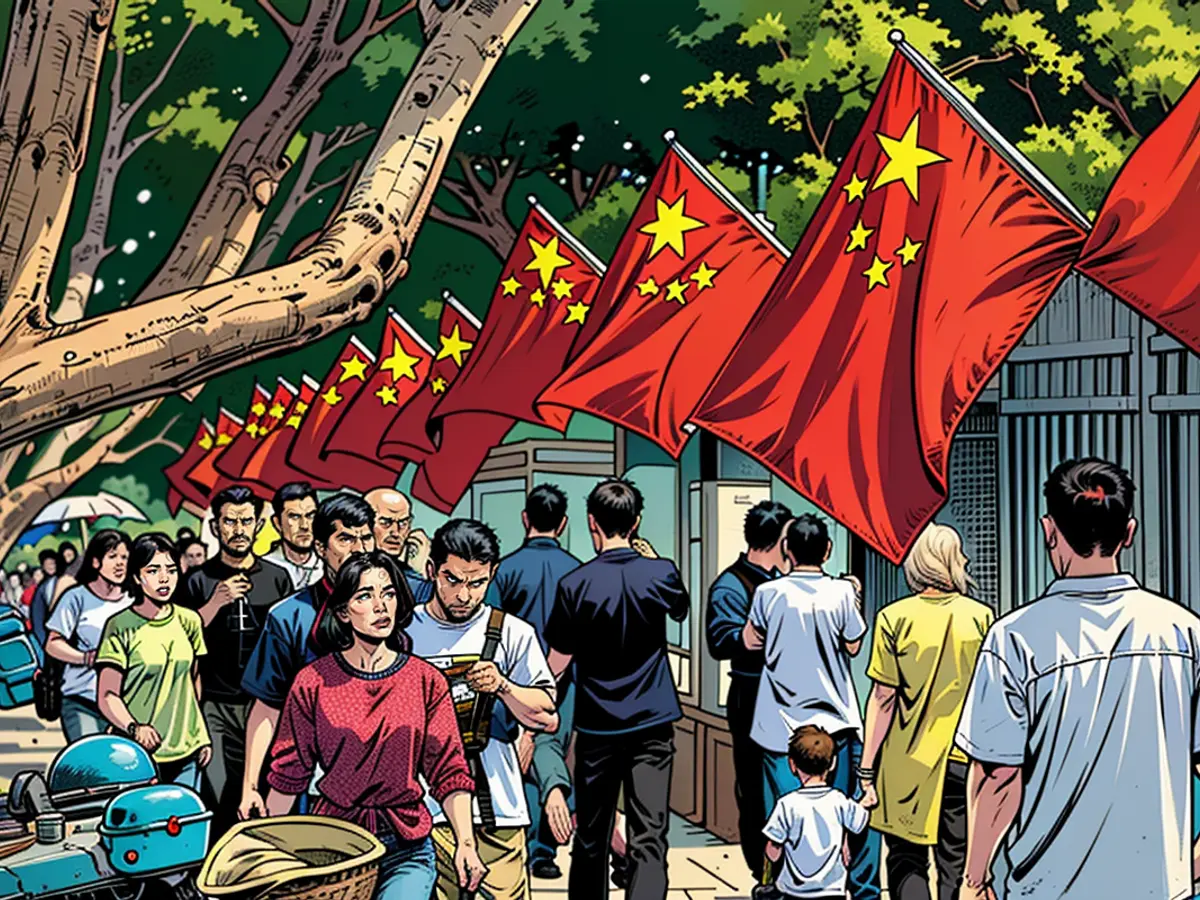Is the freedom of India's media now limited after ten years of Modi?
The last time he pursued a significant story, a devastating rape-and-murder case, it resulted in the imprisonment of a father of three for over two years and significant damage to his career and financial stability. He blames his detention on the deteriorating circumstances for journalists in India, where arrests and harassment are on the rise.
He is by no means the only journalist who feels stifled in their profession under Prime Minister Narendra Modi's 10-year reign.
The administration of the popular yet divisive leader - who has never held a solo press conference during his time in office - is accused by critics of suppressing media pluralism and intensifying the usage of counter-terrorism legislation against journalists.
As Modi seeks another five years in power during the current nationwide election, fears intensify for further deterioration in the safeguards provided to India's free press.
"I think a lot before I write," Kappan told CNN. "At any moment, anyone can file a case against me."
In October 2020, Kappan was working as a freelance reporter for a Malayalam-language news website. On his way to report on the alleged rape and murder of a Dalit teenager by upper-caste men in Hathras district of northern Uttar Pradesh state, he was taken into custody by the police. He was charged with anti-terror and money laundering offenses. The police claimed he was part of a conspiracy to disturb the area, but he insisted his arrest was an attempt to prevent his coverage of the story.
He served 28 months in prison before being granted bail by the Supreme Court in February 2023. Although he is currently free, his case is still being processed through the court system.
To challenge his bail, the Uttar Pradesh government, led by Modi's Bharatiya Janata Party (BJP), filed an affidavit with the Supreme Court. In the document, the government argued against his release, suggesting he had been publishing articles designed to create communal tension and was a part of a larger plan to foment religious conflict and incite terror.
CNN has attempted to obtain comment from the BJP on the case.
Since his release, Kappan has experienced difficulty finding permanent employment to support his family. "The main reason is the fear of newspaper editors, the media, which relies on government advertising, who don't want to upset the government," he told CNN.
He admits he is wary of additional cases being filed against him and focuses on "safe zone" stories unlikely to provoke controversy.
The mistreatment of journalists like Kappan has instilled terror in numerous other reporters.
"There was nothing Kappan could have done differently to avoid incarceration except not go report," said Kaushik Raj, who works for several publications and writes on hate crimes. "This was frightening for me."
![Siddique Kappan, a journalist held in Uttar Pradesh since October 2020 for money laundering, is released from jail on February 2, 2023. [2023-02-2 Lucknow, India] Journalist Frees After Money Laundering Case Bail Granted. Journalist Siddique Kappan, who was arrested in October 2020 in the northern state of Uttar Pradesh, walks out of jail after being granted bail in a money laundering case, in Lucknow on February 2, 2023.](https://cdn.aussiedlerbote.de/content/images/2024/05/22/281176/jpeg/4-3/1200/75/journalist-siddique-kappan-who-was-arrested-in-october-2020-in-the-northern-state-of-uttar-pradesh-walks-out-of-jail-after-being-granted-bail-in-a-money-laundering-case-in-lucknow-on-february-2-2023.webp)
India is one of the biggest media markets in the world, with over 20,000 daily newspapers and around 450 privately owned news channels broadcasting in multiple languages, according to Reporters Without Borders (RSF). Despite its size and diversity, commentators argue that the media sector is progressively aligning itself with Modi's administration.
"There was a mix of public service, public interest, and corporate private media that served a growing urban middle class and showed interest in rural development. Journalists were respected ... Regulatory mechanisms were weak but not entirely absent," said Shakuntala Banaji, a professor of media, culture, and social change at the London School of Economics.
"They've been almost entirely destroyed in the last 10 years," she added.
RSF reports that India dropped 25 positions on the Press Freedom Index between 2015 and 2023 to the 161st position - below neighboring nations like Pakistan, Sri Lanka, and Nepal. In the latest index, it advanced slightly to 159th place but still ranks lowest among its neighbors aside from Bangladesh (165th).
"India has witnessed a significant deterioration in media over the past decade," said Kunal Majumder, CPJ India representative, who noted that this included incarceration and utilizing counter-terrorism legislation to criminalize journalists.
The CPJ reported that 21 journalists were imprisoned in India between 2014 and 2023, an increase from the 4 held between 2004 and 2013.
There has also been a surge in the use of counter-terror laws - enabling detention without charge or trial for up to 180 days - against reporters. [(Reporters Without Borders, accessed 20 April 2023) -> https://rsf.org/en/india]
"There has been a significant decline in the status of media in the last ten years," said Mukul Mudgal, a retired judge who chaired a committee commissioned by the Press Council of India which in 2018 produced a report with strong critiques of the Press Council. (The Press Council of India is a self-regulatory body set up in 1966 by a government-sponsored law.)
The report laments the end of "public interest journalism which addresses issues like poverty, social justice, care for the environment, and clean water for all" and the increased preference for "coverage that caters to the sensational, plays up the political drama," Mudgal told CNN.
The Committee to Protect Journalists (CPJ), which monitors press freedoms around the world, has recorded a noticeable increase in imprisonment and the application of anti-terror laws to punish journalists. Between 2004 and 2013, only four Indian journalists were imprisoned; between 2014 and 2023, that number jumped to 21.
Law enforcement authorities have utilized the same anti-terrorism legislation against a web portal affiliated with a political organization critical of the government. A recent court filing by police alleges that NewsClick incited riots in New Delhi in 2020, dispersed false information about Covid, and financed terrorist organizations. In response, NewsClick declared that these accusations were preposterous and baseless, intended to stifle independent journalism. Prabir Purkayastha, the editor of NewsClick, was incarcerated from October 3 until Wednesday when the Supreme Court granted bail, invalidating his arrest and incarceration under the law.
"When the state employs anti-terror laws to muzzle journalists who scrutinize official institutions, we are headed toward authoritarian rule," remarked Banaji from the London School of Economics.

Regarding the apparent growing hostility towards journalists, Kanchan Gupta, senior advisor at the Ministry of Information and Broadcasting, informed CNN that media personnel are not exempt from the law.
"If journalists breach the law, they are subject to prosecution and legal action," he stated.
Indigenous Journalists Face Intimidation
Alleged harassment of journalists has increased, claimed press freedom organizations. The Amnesty International report published in 2022 highlights that Hindu nationalists emboldened to threaten and insult journalists who criticize the government.
One of the nation's most distinguished journalists, Ravish Kumar, has experienced this danger for many years, targeted with death threats and abuse from various Hindu-nationalist groups.
Kumar, who made headlines for NVDR for over two decades, announced his resignation after being told to toe the government line. He chose to leave after a hostile takeover of the channel by billionaire Gautam Adani in late 2022, fearing his inability to challenge the government due to Adani's closeness to Modi and the BJP.
NDTV replied to CNN's request for comment.
Kumar said he left NDTV because Adani's ties to Modi and the BJP would make it impossible for him to continue questioning the government.
Following his resignation, he started his own YouTube channel with a small team and has garnered approximately 10 million subscribers. He shared that he shifted to YouTube because there was nowhere else to turn.
"There is no room for people like us in Indian media anymore," said Kumar.
Critics argue that television news has been dominated by pro-government voices. A study conducted by media watchdog Newslaundry, showing more than 400 prime-time segments between February 1 and April 12, indicated that 52% of airtime was used to condemn the opposition, while another 27% promoted pro-Modi narratives.
According to Kumar, India's cultural pluralism is swiftly vanishing. "There's very little time or space left, so we're living our last moments," he commented.

Yet, Gupta, from the information ministry, insisted that it was "not true" that the media unquestioningly toe the government line. "There are 903 satellite channels in the country," he said. "If you examine the headlines across newspapers and television channels, you'll see that this generalization is not accurate."
"This narrative that media houses or individual journalists are manipulated by the government is not true," he added.
Overcoming FLastLegal Secuence Obstacles
Foreign correspondents also encounter obstacles. The Australian Broadcasting Corporation's South Asia bureau chief Avani Dias recently left the country, as well as Vanessa Dougnac, regional correspondent for four French publications.
Dias claimed the government informed her that her visa extension would be denied due to her reporting having "crossed a line," yet the government has denied this. Her visa extension was granted the day she paid her fees, on April 18, but she nonetheless chose to leave on April 20.
Dougnac, an Overseas Citizen of India (OCI) who worked in the country for 23 years, departed in February. In January, she received a communication from the Ministry of Home Affairs classifying her journalistic activities as "malignant" and "critical in a manner that creates a biased, negative image of India."
She applied for her journalistic permit as required for OCIs since 2022, but was denied. "They provided no reasons or explanations for denying my permit," she disclosed to CNN from Paris.
India's Home Ministry did not respond to CNN's inquiry about Dougnac's situation.
Furthermore, in February of last year, the Indian offices of the BBC were raided by tax authorities days after the broadcaster aired a contentious documentary criticizing Modi. The documentary, described as "anti-India trash" by a senior advisor at the Ministry of Information and Broadcasting, was subsequently blocked on social media platforms.
BJP spokesperson Gaurav Bhatia, addressing reporters, didn't mention the documentary and just noted that organizations must "follow and respect Indian law." The BBC split its Indian operations into separate entities to comply with the nation's foreign investment rules.
Dougnac was not surprised by the actions against international media.
"It's been a gradual process. It started with local journalists and gradually foreign correspondents got the impression they were next," she shared.

Even though he's seen the challenges facing journalism in India, Kappan refuses to give up on his belief in it. He feels a strong responsibility to stand up for it.
"Despite the potential dangers, the pursuit of truth must remain our top priority," he said.
Read also:
- Lack of snow also opens up new opportunities for winter tourism
- Abrupt end to e-car subsidies
- The chemical industry has little confidence
- Intersport boss hopes for sales boom through sporting events
The media industry in India has been facing criticism for aligning itself with the Modi administration, leading to a significant deterioration in media freedom. This has resulted in an increase in the number of journalists being imprisoned and the application of anti-terror laws against them. (Source: CNN)
The suppression of media pluralism and the intensified use of counter-terrorism legislation against journalists under Prime Minister Modi's leadership has negatively impacted the business of media outlets that rely on government advertising. (Source: CNN)
Source: edition.cnn.com








